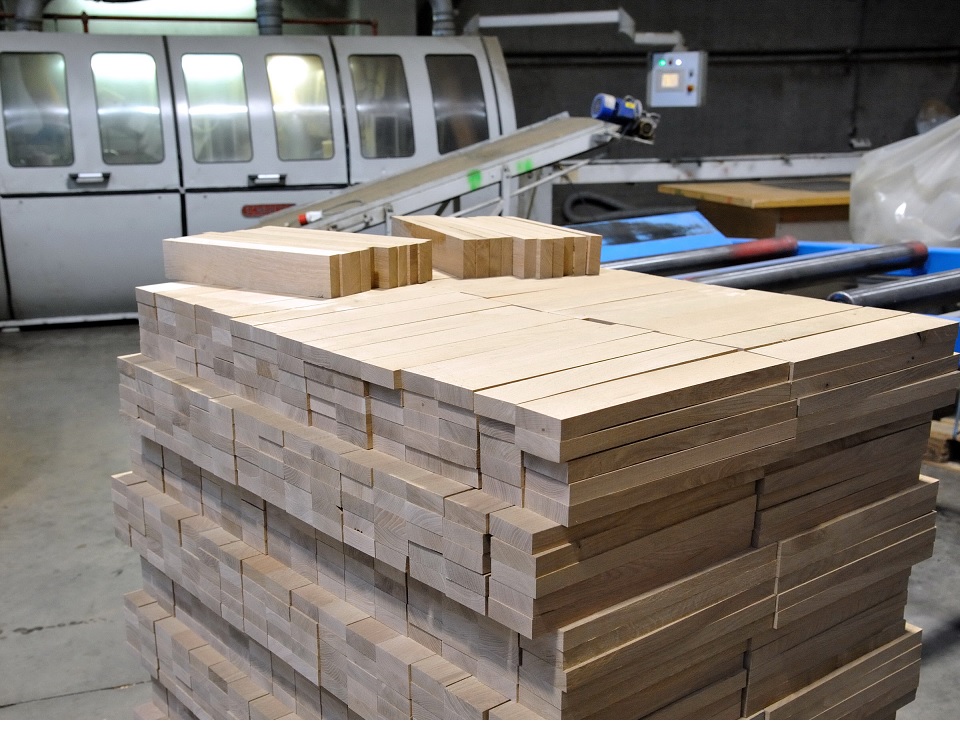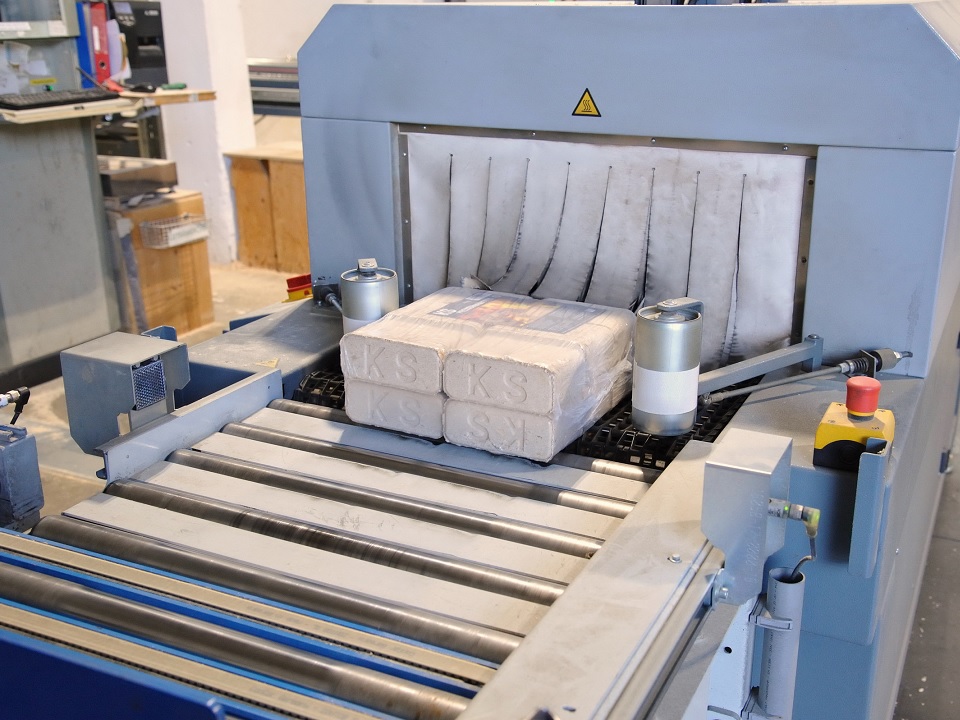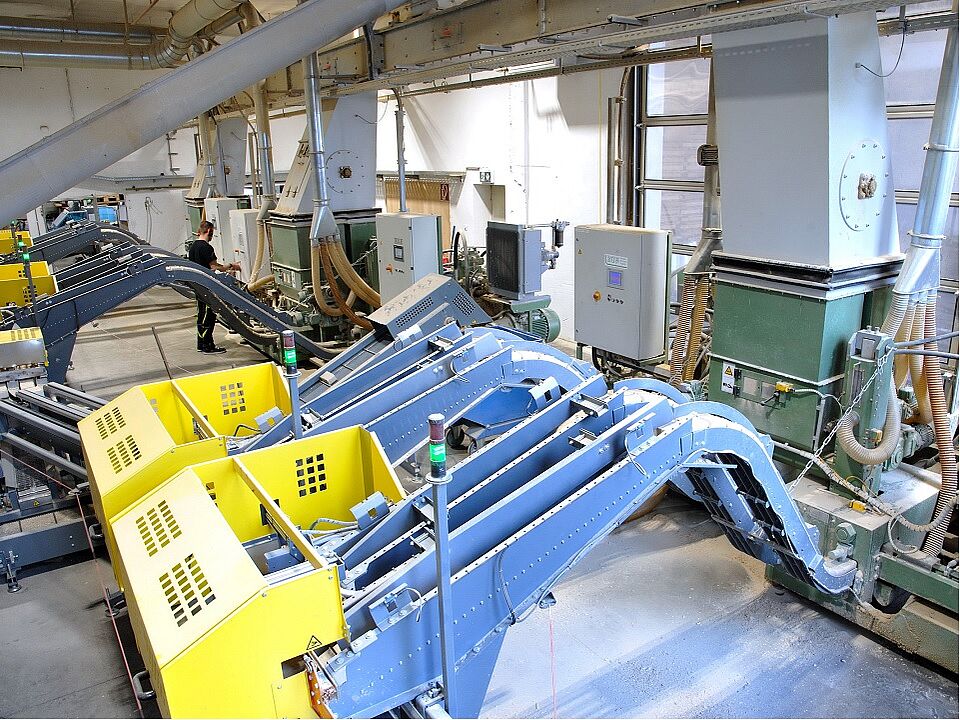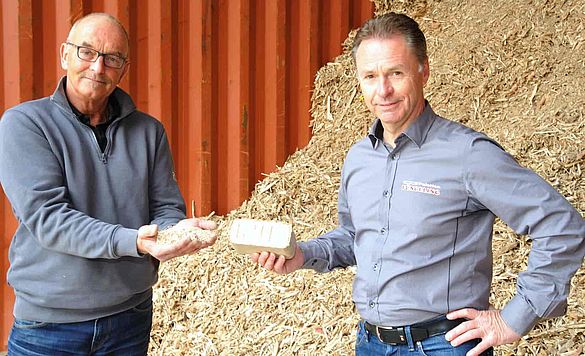Wood-flooring maker Scheucher makes full use of residuals thanks to RUF briquetting systems
Wood-flooring maker Scheucher is proud of its ultra high quality combining sustainability with economy. In order to extract the fullest from its input stock wood, it utilises six RUF briquetting systems that convert the high-volume wood chips and sawdust from its production into compact briquettes. Thanks to their high calorific value, these are in great demand and reduce the payback times for these systems to less than three years.
From the air it looks like a solar park. Yet the buildings under the 17,000 solar panels produce wood floorings of the highest quality. Covering 30,000 square metres, the photovoltaic installation on the Scheucher premises in the Südoststeiermark District is just one proof of the company’s policy not only of supplying natural, sustainable floor coverings, but to produce them in an environmentally friendly manner. And this with the highest quality and great success. In just 25 years since it started production of floor coverings, it has managed to claim a world market share of approx 2.5%, and their products made in Mettersdorf are in hot demand even in China, the USA, and Canada.
One further foundation of this family enterprise’s sustainability strategy, backed too by its approx 260 employees, is provided by the virtually 100% utilisation of the raw material wood and the associated savings in claimed natural resources. The annual production of about 2.5 million square metres of three- and two-ply floor coverings generates about 16,000 tonnes of shavings, sawdust, and sanding debris. About half of this is fed to a system that supplies heat to the company’s buildings. The remainder, about 8000 tonnes, Scheucher compresses into wood briquettes on six RUF systems.
Bulk chips – a huge logistics challenge
Scheucher opted for briquetting soon after it commenced production of its wooden floor coverings in 1996. It was forced to realise that bulk chips and sawdust posed a huge logistics challenge. To keep these contained from the environment, it needed closed receptacles that then had to be transported by road: owing to the large volumes an expensive measure involving many tours and potential pollution. Yet there were other drawbacks, for the market absorbing this wood debris started to prove difficult. “Often our revenue from this bulk material, purchased primarily by the paper industry, just about covered the transport costs,” reported Plant Manager Karl Kaufman. In consequence, the wood-flooring maker fetched and set up at its plant a RUF RB 440 press as far back as 2000.
All processes targeting chips and dusts at Scheucher have been automated, as well as the entire production of briquettes itself. Each woodworking machine is linked to a central extraction system that conveys the debris into two silos of 600 and 700 cubic metres respectively. From there, conveying screws supply it to either the inhouse heating system or the hall with its six briquetting presses.
From debris to briquette – fully automated
These RUF systems are paired off to form a unit each that share a chip supply. “The systems start and stop as soon as the collecting hopper contains enough material or is empty,” explained Karl Kaufmann. The wood debris is compressed under a pressure as high as 1700 kg/cm2 to form briquettes measuring about 150 × 60 × 90 mm with a minimum density of 1.0 kg/l. “These are of pure wood without any additives. The high stability of the briquettes is due alone to the huge press forces,” explained RUF Sales Manager Stefan Schulz.
The briquettes discharged from all six presses are manoeuvred over a rail directly on a conveyor that transports them to the packaging station. This stacks two layers each containing 2 × 3 briquettes, adds a product data sheet, and seals the package in film. A robot then pallets them into 10 kg packages.
Thanks to the high press forces on the RUF systems, the briquettes exhibit a higher density than chopped wood. Also their moisture content is lower, and consequently their calorific value higher: 5 kWh/kg with 12% residual moisture. Scheucher briquettes exhibit a somewhat higher calorific value: their production of wood floorings demand residual moistures in the 6–8% range.
Size inspections safeguard unvarying weights
Production at Scheucher makes nearly full use of the potential promised by RUF presses designed for 24/7 unattended operations. “Nearly”, because this wood-flooring manufacturer produces on only five days a week, and that in two shifts. The three models purchased last have already been equipped for the automated measurement and correction of briquette lengths. Each takes immediate corrective action when it detects changes in the composition of the briquetted wood debris that could lead to fluctuations in the briquette length and therefore weight. This safeguards the unvarying 850 g weight of each briquette – with negligible variations. And, of course, the 10 kg package of twelve briquettes promised to customers. “The latest RUF systems can be fitted with an optional Profinet or Profibus interface for simple integration in a central machine monitoring and control system,” stressed Stefan Schulz.
The transformation of production debris into valuable secondary energy sources pays off not only in terms of sustainability. Briquettes enjoy high demand from wood-stove users, so the investment in briquetting systems is recouped pretty quickly. Karl Kaufmann confirmed that the presses paid off in two to three years. And this despite briquette revenue that has persisted on a considerably lower level than that following the exploding energy prices in 2022.
Scheucher Holzindustrie GmbH
… is a family-run enterprise based in Mettersdorf in southeast Styria. The company was founded as a sawmill in 1920 and experienced many changes to its portfolio until it commenced production of wood floorings in 1996. It produces annually about 2.5 million square metres of three- and two-ply floor coverings. Of this floor production, 85–90% present a top ply of oak. About a third of the floor coverings are exported. The fourth largest sales market, after Austria, Germany, and Switzerland, is China. They have found homes in 35 countries, including Scandinavia, the USA, and Canada. Supported by its 260 employees, the company last recorded sales of about EUR 95 million.
Inhouse care and servicing
Briquetting, therefore, has turned into a success story for Scheucher. “The systems are running very reliably, and briquette sales have always been excellent,” summed up Karl Kaufmann. At the same time, operating costs remain unvaryingly low. “We see to the care and servicing ourselves. The time needed is only a few hours a week. We can even replace parts subjected to a certain wear and tear under the high forces, for instance the ram or the mould, without outside assistance,” resumed the plant manager. Hence the expenditure on servicing and wearing parts amounts to a very low single-digit euro figure per tonne of wood briquettes, or far below 1% of the sales revenue. In this respect Kaufmann is convinced that the next expansion will again be taking the form of RUF presses.


![[Translate to EN:] Firma Scheucher und RUF Mitarbeiter](/fileadmin/_processed_/3/7/csm_RUF_Brikettierung_B07_Scheucher_43ae1ce817.jpg)
![[Translate to EN:] Holzspäne werden zu Briketts verarbeitet](/fileadmin/user_upload/RUF_Brikettierung_B02a_Scheucher.jpg)
![[Translate to EN:] Brikettieranlage RUF](/fileadmin/_processed_/6/e/csm_RUF_Brikettierung_B03a_Scheucher_d0a4c2f097.jpg)
![[Translate to EN:] Fertige Holzbriketts aus Holzresten](/fileadmin/user_upload/RUF_Brikettierung_B06_Scheucher.jpg)



![[Translate to EN:] [Translate to EN:]](/fileadmin/_processed_/c/f/csm_Angenehme_Waerme_mit_RUF_Holzbriketts_f00ade45ee.jpg)
